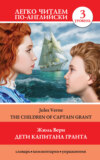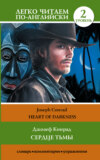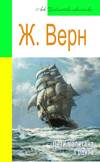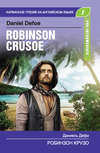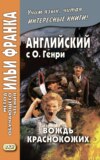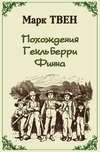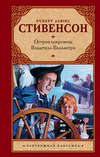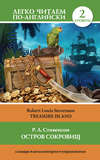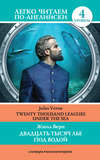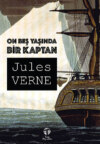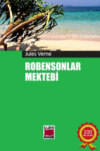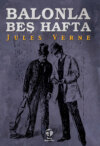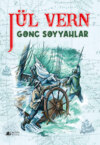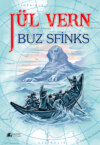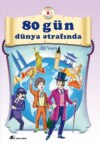Kitabı oku: «Дети капитана Гранта / The Children of Captain Grant», sayfa 3
Chapter VIII. The Geographer’s Resolution
Meantime the yacht was making rapid progress toward the equator. On the 30th of August they sighted the Madeira group of islands, and Glenarvan, true to his promise, offered to put in there, and land his new guest.
But Paganel said:
“My dear Lord! Tell me, did you intend to stop at Madeira before I came on board?”
“No,” replied Glenarvan.
“Well, then, if it is all the same to you, we might go on to the Canary Isles40 instead.”
“Certainly. It will not the least interfere with our route.”
“I know it will not, my dear Lord. In the Canary Islands, you see, there is much to study. This is an opportunity, and I should make the ascent of the famous mountain while I am waiting for a ship to take me back to Europe.”
“As you please41, my dear Paganel,” said Lord Glenarvan.
Next day, about 2 PM, John Mangles and Paganel were walking on the poop. The Frenchman was assailing his companion with all sorts of questions about Chili, when the captain interrupted him, and pointing toward the southern horizon, said:
“Monsieur Paganel?”
“Yes, my dear Captain.”
“Please look in this direction. Don’t you see anything?”
“Nothing.”
“You’re not looking in the right place. It is not on the horizon, but above it in the clouds.”
“In the clouds? I might well not see. I see nothing.”
“Then you don’t want to see. The weather is bad over there, we cannot go to the islands”.
“Take my advice, Monsieur Paganel,” Lady Helena appeared. “Look. It was providence that sent us the document. The same providence brought you on board the Duncan. Don’t leave it.”
“Shall I say yes, my good friends? Come, now, tell me, you want me very much to stay, don’t you?” said Paganel.
“And want to stay yourself, now, don’t you, Paganel?” returned Glenarvan.
“Exactly,” confessed the learned geographer; “but I was afraid it would be inconsiderate.”
Chapter IX. Through the Straits of Magellan 42
The joy on board was universal when Paganel’s resolution was made known.
The voyage had been made without difficulty. Everybody was full of hope, for in this search for Captain Grant, each day seemed to increase the probability of finding him. The captain was among the most confident on board, but his confidence mainly arose from the longing desire he had to see Miss Mary happy.
As for the learned geographer, he was probably the happiest man in all the southern hemisphere. He spent the whole day in studying maps, which were spread out on the saloon table. Paganel also came across a regular cargo of old books in the chief officer’s chest. They were in a very damaged condition, but among them he found a few Spanish volumes, and determined to master the language of Cervantes43, as no one on board understood it, and it would be helpful in their search along the Chilian coast. He studied it furiously, and kept constantly muttering Spanish words. He spent his leisure hours in teaching young Robert, and instructed him in the history of the country they were so rapidly approaching.
On the 25th of September, the yacht arrived off the Straits of Magellan, and entered them without delay. This route is generally preferred by steamers on their way to the Pacific Ocean. The exact length of the straits is 372 miles.
Paganel was vexed. He insisted that Patagonia without Patagonians was not Patagonia at all.
But Glenarvan replied:
“Patience, my dear geographer. We shall see the Patagonians yet.”
“I am not sure of it.”
“But there is such a people, anyhow,” said Lady Helena.
“I doubt it much, madam, since I don’t see them.”
“But surely the very name Patagonia means ‘great feet’ in Spanish.”
“Oh, the name is nothing,” said Paganel. “And besides, to speak the truth, we are not sure if that is their name.”
“They are tall,” said Glenarvan.
“I don’t know that.”
“Are they little, then?” asked Lady Helena.
“No one can affirm that they are.”
“About the average, then?” said McNabbs.
“I don’t know that either,” said Paganel.
“But what is the truth?” asked Lady Helena.
“Just this, madame; the Patagonians have short legs, and a large bust. But the Straits of Magellan are very magnificent, even without Patagonians.”
Just at this moment the Duncan was rounding the peninsula between splendid panoramas.
Chapter X. The Course Decided
A week after they had doubled the Cape Pilares44, the Duncan steamed into the bay of Talcahuano45, a magnificent estuary, twelve miles long and nine broad. The weather was splendid. From November to March the sky is always cloudless, and a constant south wind prevails.
John Mangles had sailed as near the archipelago of Chiloe46 as possible, and examined the coast, hoping to discover some traces of the shipwreck: a broken spar, or any fragment of the vessel—but nothing whatever was visible, and the yacht continued its route, till she dropped anchor at the port of Talcahuano.
Glenarvan had a boat lowered immediately, and went on shore, accompanied by Paganel.
“Let us go to the Custom-house,” said Glenarvan.
They were informed that the British Consul lived at Concepcion, an hour’s ride distant. Glenarvan and Paganel were soon within the walls of the great city. They went straight on to the house of her Majesty’s Consul, who received them very courteously. But to the question whether a three-mast vessel, called the Britannia, had gone ashore, he gave a decided negative. No report of such an event had been made to him, or any of the other consuls.
Glenarvan went back to Talcahuano, and made a thorough investigation of the whole seaboard. But it was all in vain. Lord Glenarvan returned to the yacht to report his ill success. Mary Grant and her brother could not restrain their grief. Lady Helena did her best to comfort them by loving caresses, while Jacques Paganel took up the document and began studying it again.
Glenarvan said:
“Paganel! Have we made an erroneous interpretation of the document? Have we mistaken the place where the catastrophe occurred?”
Paganel was silent.
“Besides,” said Glenarvan, “does not the word INDIEN prove we are right?”
“Perfectly so,” replied McNabbs.
“And is it not evident, then, that at the moment of writing the words, the shipwrecked men were made prisoners by the Indians?”
“My Lord,” said Paganel, “even if your other conclusions are right, this, at least, seemed to me irrational.”
“What do you mean?” asked Lady Helena, while all eyes were fixed on the geographer.
“I mean this,” replied Paganel, “that Captain Grant is now a prisoner among the Indians, and I further add that the document states it unmistakably.”
“But that is impossible,” replied Lord Glenarvan.
“Impossible! And why, my noble friend?” asked Paganel, smiling.
“Because the bottle could only be thrown into the sea just when the vessel went to pieces on the rocks, and consequently the latitude and longitude given refer to the actual place of the shipwreck.”
“There is no proof of that,” replied Paganel.
“Except this fact, my dear Paganel, that there was no sea, and therefore they could not fling the bottle into it.”
“Unless they flung it into a river which ran into the sea,” returned Paganel.
This reply was so unexpected, that it made them all completely silent for a minute. Lady Helena was the first to speak.
“What an idea!” she exclaimed.
“And what a good idea,” was Paganel’s rejoinder to her exclamation.
“What would you advise, then?” said Glenarvan.
“My advice is to follow the 37th parallel from the point where it touches the American continent to where it dips into the Atlantic, without deviating from it half a degree, and possibly in some part of its course we shall meet the shipwrecked party.”
“There is a poor chance of that,” said the Major.
“But,” returned Paganel, “we cannot lose it.”
He unrolled a map of Chili and the Argentine provinces as he spoke, and spread it out on the table.
“Just follow me for a moment,” he said, “across the American continent. Let us make a stride across the narrow strip of Chili, and over the Cordilleras of the Andes47, and get into the heart of the Pampas. Here are the Rio Negro48 and Rio Colorado49, intersected by the 37th parallel, and any of them might carry the bottle on its waters.”
His generous enthusiasm so touched his auditors that, involuntarily, they rose to their feet and grasped his hands, while Robert exclaimed:
“Yes, my father is there!”
“And where he is,” replied Glenarvan, “we’ll manage to go, my boy, and find him. Nothing can be more logical than Paganel’s theory, and we must follow the course he points out without the least hesitation.”
“Monsieur Paganel,” asked Lady Helena, “you have no fear then that if the poor fellows have fallen into the hands of the Indians their lives at least have been spared?”
“What a question? Why, madam, the Indians are not cannibals! Far from it. One of my friends was three years a prisoner among the Indians in the Pampas. A European is a useful being in these countries. The Indians know his value, and take care of him as if he were some costly animal.”
“Go!” said Lord Glenarvan. “And as soon as possible. What route must we take?”
“One that is both easy and agreeable,” replied Paganel.
“Let us see the map,” said the Major.
“You see, my friend,” said Paganel, “it is a straight course. In thirty days we shall go over it, and gain the eastern side before the Duncan.”
“Then the Duncan is to cruise between Corrientes50 and Cape Saint Antonie51,” said John Mangles.
“Just so.”
“And how is the expedition to be organized?” asked Glenarvan.
“As simply as possible. I think that Lord Glenarvan, our natural leader; the Major, and your humble servant, Jacques Paganel.”
“And me,” interrupted Robert.
“Robert, Robert!” exclaimed Mary.
“And why not?” returned Paganel. “Travels form the youthful mind. Yes, Robert, we four and three of the sailors.”
“Then we can’t accompany you?” said Lady Helena, with a shade of sadness in her eyes.
“My dear Helena, the journey will so soon be accomplished.”
“Yes, I understand, it is all right; and I do hope you may succeed.”
On the 14th, the whole search party assembled in the saloon to bid farewell52 to those who remained behind. Glenarvan, Paganel, McNabbs, Robert Grant, Tom Austin, Wilson53, and Mulrady54, stood armed with carbines and revolvers. Guides and mules awaited them at the harbor.
“It is time,” said Lord Glenarvan at last.
“Go then, dear Edward,” said Lady Helena, restraining her emotion. “God help you!” she called out.
“Heaven will help us, madam,” shouted Paganel, in reply. “You may be sure we’ll help ourselves.”
At the same moment Lord Glenarvan gave the signal to start, and the Duncan steamed out at full speed toward the broad ocean.
Chapter XI. Traveling in Chili
The native troops organized by Lord Glenarvan consisted of three men and a boy. The captain of the muleteers was an Englishman. It was for them a lucky thing, because nobody understood when Paganel was speaking Spanish.
Glenarvan, an experienced traveler, who knew how to adapt himself to the customs of other countries, bought the Chilian costume for himself and his whole party.
The weather was splendid when they started, the sky was cloudless blue. They marched rapidly along the winding shore, in order to gain the extremity of the parallel, thirty miles south. No one spoke much the first day, for the smoke of the Duncan was still visible on the horizon. Paganel talked to himself in Spanish, asking and answering questions.
On the 17th the country became more diversified, and the rising ground indicated their approach to a mountainous district. Rivers were numerous. Paganel consulted his maps, and when he found any of those streams not marked, he would exclaim, with a charming air of vexation:
“A river which hasn’t a name is like having no civil standing55. It has no existence in the eye of geographical law.”
He christened them forthwith, without the least hesitation, and marked them down on the map, qualifying them with the most beautiful adjectives he could find in the Spanish language.
“What a language!” he said. “How full and sonorous it is! It is like the metal church bells are made of.”
“But, I say, do you make any progress in it?” asked Glenarvan.
“Most certainly, my dear Lord. Ah, if it wasn’t the accent, that wretched accent!”
At five in the evening they stopped in a gorge, some miles above the little town of Loja56, and encamped for the night at the foot of the great Cordilleras.
Chapter XII. Eleven Thousand Feet Aloft
Nothing of importance had occurred hitherto in the passage through Chili. Glenarvan followed his guide step by step. He saw that his perplexity was increasing as the way became more difficult, but did not dare to interrogate him, perhaps, thinking that both mules and muleteers were very much governed by instinct, and it was best to trust to them.
For about an hour longer the guide kept wandering. At last he was stopped. They were in a narrow valley, one of gorges; a wall rose perpendicularly before them, and barred further passage.
The guide, after vain attempts at finding an opening, dismounted, crossed his arms, and waited. Glenarvan went up to him and asked if he had lost his way.
“No, your Lordship,” was the reply.
“You are sure you are not mistaken?”
“I am not mistaken. See! There are the remains of a fire left by the Indians, and there are the marks of the mares and the sheep.”
“They must have gone on then.”
“Yes, but the last earthquake has made the route impassable.”
“To mules,” said the Major, “but not to men.”
“Ah, that’s your concern57; I have done all I could. My mules and myself are at your service to try the other passes of the Cordilleras.”
“And that would delay us?”
“Three days at least.”
Glenarvan listened silently. He saw the guide was right. His mules could not go farther. Glenarvan appealed to his companions and said:
“Will you go on in spite of all the difficulty?”
“We will follow your Lordship,” replied Tom Austin.
“And even precede you,” added Paganel. “What is the problem? We have only to cross the top of the mountain chain, and once over, nothing can be easier for descent than the slopes we shall find there. When we get below, we shall find Argentine shepherds, who will guide us through the Pampas. Let’s go forward then, I say, and without a moment’s hesitation.”
“Forward!” they all exclaimed.
“You will not go with us, then?” said Glenarvan to the guide.
“I am the muleteer,” was the reply.
“As you please58,” said Glenarvan.
“We can do without him59,” said Paganel. “I’m quite sure I’ll lead you to the foot of the mountain as straight as the best guide in the Cordilleras.”
So Glenarvan bade farewell to the guide and his peons and mules. The arms and instruments, and a small stock of provisions were divided among the seven travelers.
They were not far now from the highest peak of the Cordilleras, but there was not the slightest trace of any path. The entire region had been overturned by recent shocks of earthquake, and all they could do was to keep on climbing higher and higher. Fortunately the weather was calm and the sky clear.
The Major went as quick as was necessary, neither more nor less, climbing without the least apparent exertion. Perhaps he hardly knew, indeed, that he was climbing at all, or perhaps he fancied he was descending.
The whole aspect of the region had now completely changed. Huge blocks of glittering ice stood up on all sides, reflecting the early light. They had come now to the region of shrubs and bushes, which, higher still, gave place to grasses and cacti. At 11,000 feet all trace of vegetation had disappeared.
About two o’clock they came to an immense barren plain, without a sign of vegetation. The air was dry and the sky unclouded blue. At this elevation rain is unknown.
At three o’clock Glenarvan stopped and said:
“We must rest.”
He knew if he did not himself propose it, no one else would.
“Rest?” rejoined Paganel; “we have no place of shelter.”
“It is absolutely necessary, however, if it were only for 60Robert.”
“No, no,” said the courageous lad; “I can still walk; don’t stop.”
“You shall be carried, my boy; but we must get to the other side of the Cordilleras. There we may perhaps find some hut to cover us.”
“Are you all of the same opinion?” said Glenarvan.
“Yes,” was the unanimous reply: and Mulrady added, “I’ll carry the boy.”
They had a frightful height to climb. Drops of blood stood on the gums and lips, and respiration became hurried and difficult. Falls became frequent, and those who fell could not rise again, but dragged themselves along on their knees.
Suddenly the Major stopped and said, in a calm voice, “A hut!”
